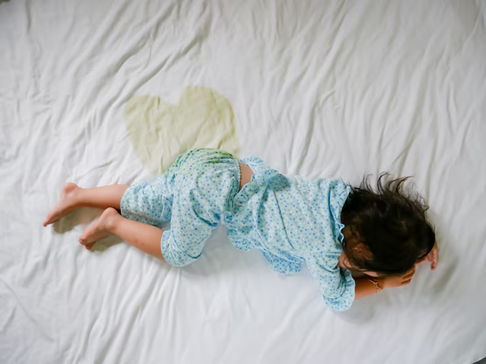It is also known as nocturnal enuresis, refers to involuntary urination during sleep beyond the age of expected bladder control (typically around 5-6 years old). It is a common issue affecting many children, with varying degrees of frequency and severity.
Causes and Contributing Factors:
- Genetics: Bedwetting often runs in families, suggesting a genetic component.
- Developmental Delays: Some children may experience delays in bladder maturation, leading to nighttime accidents.
- Hormonal Imbalance: Insufficient production of antidiuretic hormone (ADH) can result in increased nighttime urine production.
- Emotional Stress: Anxiety, changes in routine, or emotional stressors can contribute to bedwetting episodes.
- Deep Sleep Patterns: Children who sleep deeply may not wake up when their bladder is full.
Types of Bedwetting:
- Primary Nocturnal Enuresis: Occurs in children who have never achieved consistent dryness at night.
- Secondary Nocturnal Enuresis: Develops after a period of dryness, often due to stress or medical conditions.
Management and Treatment Options:
Behavioral Techniques:
- Bedtime Routine: Encouraging regular bedtime habits and adequate fluid intake management.
- Bladder Training: Prompting children to use the bathroom before bed and gradually increasing the interval between bathroom visits.
- Motivational Strategies: Using reward systems or incentives for dry nights.
Medical Interventions:
- Medications: Prescription medications are prescribed to reduce nighttime urine production or improve bladder control.
- Alarm Therapy: Bedwetting alarms that sound when moisture is detected can help condition children to wake up when they need to urinate.
Supportive Measures:
- Parental Support: Providing understanding and encouragement to reduce stress and anxiety related to bedwetting.
- Educational Support: Informing teachers or caregivers about the child’s condition to ensure appropriate handling at school or during sleepovers.
When to Seek Medical Advice
- If bedwetting persists beyond the age of 6-7 years or is accompanied by other symptoms such as pain or discomfort during urination, it is advisable to consult a healthcare provider.
- Medical evaluation is necessary to rule out underlying medical conditions contributing to bedwetting.
Bedwetting is a common childhood issue that can have various causes and impacts. Effective management involves understanding the contributing factors, implementing behavioral strategies, considering medical interventions when necessary, and providing support to children and families affected by nocturnal enuresis. With appropriate intervention and support, many children outgrow bedwetting and achieve dry nights naturally over time.

